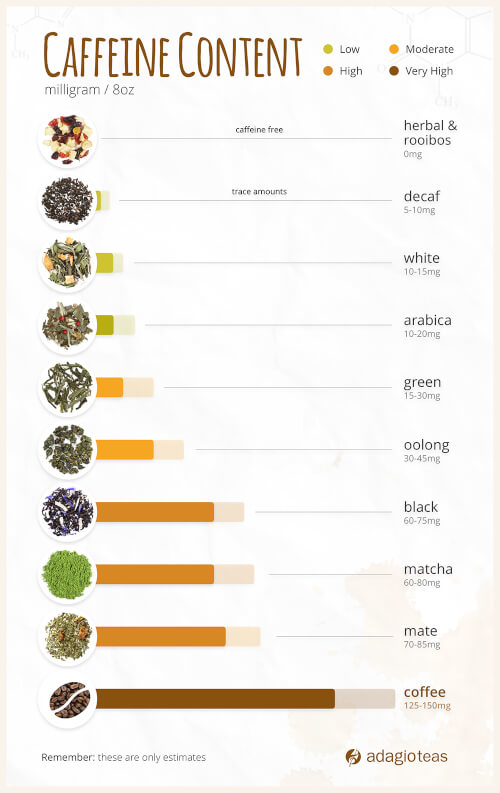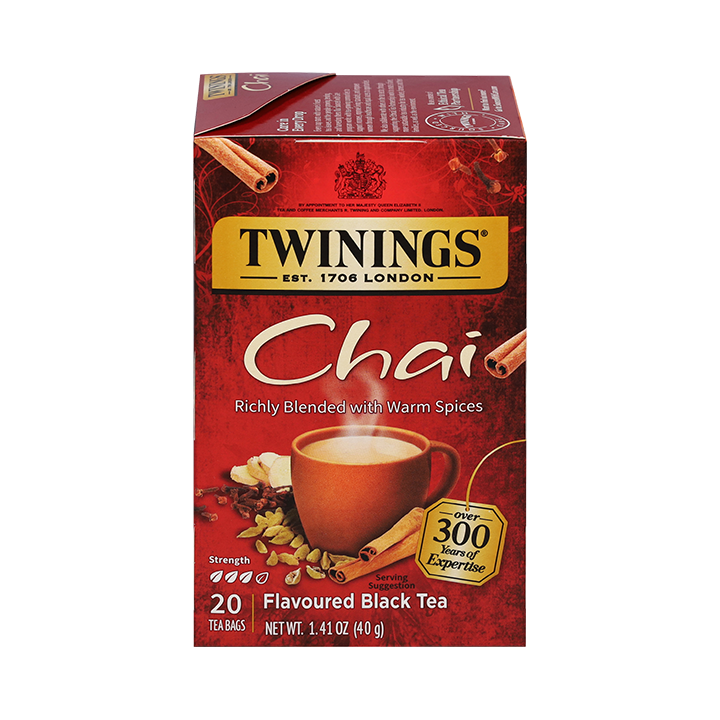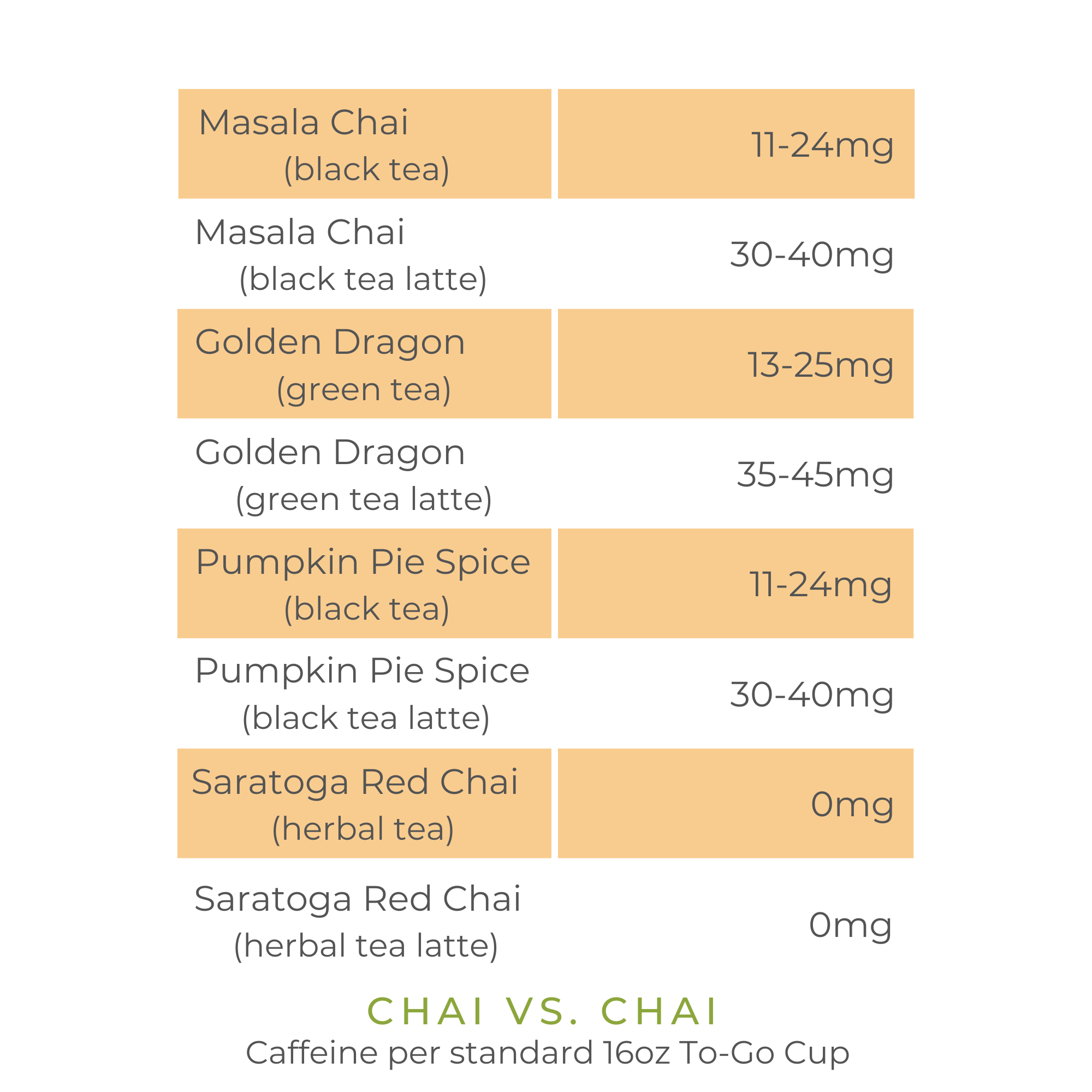Yes, chai tea does have caffeine. The amount can vary, but it is generally lower than coffee.
Chai tea, a flavorful blend of black tea, spices, and milk, originates from India. It’s a popular drink worldwide, enjoyed for its rich taste and aromatic spices. Many wonder about its caffeine content. If you love a good cup of chai but are concerned about caffeine, this is the guide for you.
Understanding the caffeine in chai can help you decide when and how to enjoy this delicious beverage. Let’s explore the caffeine content in chai tea and what it means for your daily routine.

Credit: www.adagio.com
Introduction To Chai Tea
Chai tea is a flavorful blend of tea, spices, and herbs. This warm and inviting beverage has gained worldwide popularity. But what exactly is chai tea, and where does it come from?
Origins And History
The word “chai” means “tea” in Hindi. Chai tea, also known as “masala chai,” originated in India. The tradition of drinking spiced tea dates back over 5,000 years. In ancient times, chai was used as an Ayurvedic remedy. It was believed to have healing properties.
British colonists in the 19th century introduced black tea to India. The locals blended black tea with local spices, milk, and sweeteners. This unique combination created the chai tea we know today.
Popular Variations
Chai tea comes in many variations. Each region in India has its own twist on the recipe. Here are some popular versions:
- Masala Chai: The most common form, made with black tea, milk, and spices like cardamom, cinnamon, ginger, and cloves.
- Kashmiri Chai: Uses green tea instead of black tea and includes saffron, almonds, and a hint of salt.
- Punjabi Chai: Stronger and spicier, often including black pepper and fennel seeds.
Chai tea is not just limited to these variations. Modern versions include iced chai, chai lattes, and even chai-flavored desserts.
Understanding the origins and popular variations of chai tea helps appreciate its rich cultural history. This beverage continues to warm hearts around the world.
Ingredients In Chai Tea
Chai tea is a flavorful beverage enjoyed by many worldwide. The rich taste comes from a blend of spices and tea leaves. Each ingredient adds to its unique flavor. Let’s explore the key ingredients in chai tea.
Traditional Spices
Traditional chai tea includes a mix of spices. The most common spices are cardamom, cinnamon, ginger, cloves, and black pepper. Cardamom adds a sweet, floral note. Cinnamon provides warmth and depth. Ginger gives a spicy kick. Cloves offer a strong, aromatic flavor. Black pepper adds a hint of heat. These spices create a balanced, aromatic drink.
Tea Base
The base of chai tea is usually black tea. Black tea gives the drink its caffeine content. Assam and Darjeeling are popular choices. Assam tea has a bold, malty flavor. Darjeeling tea is lighter and more floral. Some variations use green tea. Green tea has a milder taste and less caffeine. The tea base complements the spices, creating a harmonious blend.
Caffeine Content In Chai Tea
Chai tea is a popular drink known for its bold flavors. Many people wonder about its caffeine content. Let’s explore how much caffeine is in chai tea.
Comparison With Other Teas
When comparing chai tea with other teas, the caffeine levels vary.
| Type of Tea | Caffeine Content (per 8 oz) |
|---|---|
| Chai Tea | 40-70 mg |
| Green Tea | 20-45 mg |
| Black Tea | 40-70 mg |
| Herbal Tea | 0 mg |
Chai tea has similar caffeine levels to black tea. It has more caffeine than green tea, but less than coffee.
Factors Affecting Caffeine Levels
Several factors affect the caffeine content in chai tea:
- Type of Tea Leaves: Black tea leaves have more caffeine.
- Brewing Time: Longer brewing increases caffeine levels.
- Water Temperature: Hotter water extracts more caffeine.
By adjusting these factors, you can control the caffeine in your chai tea. Steep your tea for a shorter time if you want less caffeine. Use cooler water to reduce caffeine extraction.
Chai tea offers a flavorful experience. You can enjoy it knowing the caffeine content suits your needs.
Health Benefits Of Chai Tea
Chai tea is not just a delightful beverage with a rich history; it also offers several health benefits. This aromatic tea blend combines black tea with spices like cinnamon, cardamom, ginger, and cloves. These ingredients not only enhance its flavor but also provide numerous health advantages.
Antioxidant Properties
Chai tea contains black tea, which is rich in antioxidants. These compounds help protect your cells from damage. Black tea is known for its high levels of polyphenols. These antioxidants can reduce the risk of chronic diseases.
The spices in chai tea also contribute to its antioxidant properties. Cinnamon and cloves are particularly high in antioxidants. Drinking chai tea can help neutralize harmful free radicals in the body. This can lead to better overall health.
Digestive Aid
Chai tea is excellent for digestion. Ginger, a common ingredient in chai, is well-known for its digestive benefits. It can help reduce nausea and improve overall digestion.
Cardamom and cloves also play a role in aiding digestion. These spices can help reduce bloating and gas. They also promote better gastrointestinal health. Drinking chai tea after meals can be soothing for the stomach.
Here’s a quick look at how chai tea ingredients aid digestion:
| Ingredient | Digestive Benefit |
|---|---|
| Ginger | Reduces nausea, improves digestion |
| Cardamom | Reduces bloating, promotes gut health |
| Cloves | Reduces gas, supports digestive health |
Chai tea is a tasty way to enjoy numerous health benefits. Its antioxidant and digestive properties make it a great addition to your daily routine.
Potential Side Effects
Chai tea is a delicious and popular drink. But it does have potential side effects. These side effects may affect some people more than others. Let’s explore some of these potential side effects.
Caffeine Sensitivity
Chai tea contains caffeine. For some, this can cause issues. People with caffeine sensitivity may experience:
- Jitters or shaking
- Increased heart rate
- Insomnia or trouble sleeping
- Headaches
- Digestive issues
These symptoms can be mild or severe. It depends on the individual’s sensitivity to caffeine. If you think you have caffeine sensitivity, consider drinking less chai tea.
Allergic Reactions
Chai tea has various ingredients. This includes black tea, spices, and milk. Some people may be allergic to one or more of these ingredients. Common allergic reactions include:
- Hives or skin rash
- Swelling of the lips, tongue, or throat
- Difficulty breathing
- Stomach pain or nausea
- Anaphylaxis in severe cases
If you suspect an allergic reaction, seek medical help immediately. Always check the ingredients before drinking chai tea.

Credit: twiningsusa.com
Decaffeinated Chai Options
Many tea lovers seek a comforting cup of chai without the caffeine. Decaffeinated chai options can provide the same warming spices without the jitters. Let’s explore how to make or find decaf chai.
Preparation Methods
Homemade decaf chai can be easy to prepare. Start with decaffeinated black tea bags. Add spices like cinnamon, cardamom, ginger, and cloves. Brew the tea with milk or a non-dairy alternative. Sweeten to taste with honey or sugar.
Another method uses herbal tea as a base. Rooibos or chamomile can be good choices. These teas have no caffeine. Add your favorite chai spices and brew as usual. The result is a soothing, caffeine-free chai.
Store-bought Alternatives
Many brands offer decaffeinated chai in stores. Look for labels that specify “decaf” or “caffeine-free”. These options are convenient and quick to prepare. Some come in tea bags, while others are pre-mixed concentrates. Just add hot water or milk.
Herbal chai blends are another option. These do not contain traditional tea leaves. Instead, they use spices and herbs to mimic chai flavors. Always check the ingredient list to ensure there is no caffeine.
Decaffeinated chai options are plentiful. Whether homemade or store-bought, you can enjoy chai without the caffeine buzz.
Brewing The Perfect Chai
Brewing the perfect chai tea is an art. It involves a blend of rich flavors, aromatic spices, and precise timing. Whether you prefer traditional methods or enjoy modern twists, each technique brings out unique qualities in this beloved beverage.
Traditional Methods
Traditional chai preparation starts with black tea leaves. Water and milk are added in equal parts. The mixture is brought to a simmer. Spices like cardamom, cinnamon, ginger, and cloves are added. Each spice contributes to the complex flavor profile.
Sweeteners such as sugar or honey are mixed in. The tea is then strained into cups. This method offers a rich, comforting drink. It’s perfect for cold days.
Modern Twists
Modern twists on chai include using different bases. Green tea or rooibos can replace black tea. This changes the flavor and caffeine content. Plant-based milks like almond or oat are popular. They offer a new texture and taste.
Some add unique spices. Star anise, turmeric, or vanilla add new layers of flavor. Sweeteners also vary. Agave syrup or coconut sugar provide different sweetness levels. These modern methods make chai adaptable to many preferences.

Credit: www.bigelowtea.com
Frequently Asked Questions
Does Chai Tea Have Caffeine?
Yes, chai tea contains caffeine. The amount varies based on ingredients and preparation methods. Typically, it has less caffeine than coffee but more than green tea.
How Much Caffeine In Chai Tea?
A standard cup of chai tea has about 40-60 mg of caffeine. This amount can vary depending on the brand and preparation.
Is Chai Tea Caffeine-free?
No, traditional chai tea is not caffeine-free. However, you can find caffeine-free or decaffeinated versions available in the market.
Can Chai Tea Keep You Awake?
Yes, due to its caffeine content, chai tea can help keep you awake. It provides a mild energy boost.
Conclusion
Chai tea does contain caffeine, but in smaller amounts than coffee. It can be a delightful alternative for those seeking a milder boost. Enjoy it hot or iced, with milk or plain. Its spices offer unique flavors and potential health benefits.
So, savor a cup of chai tea, knowing it provides a gentle lift. Experiment with different blends to find your favorite. With chai tea, you get a tasty drink and a moderate caffeine fix.
